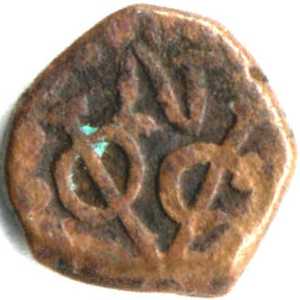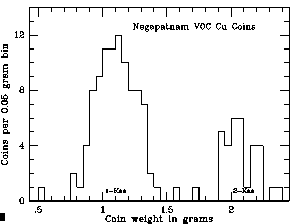
On 1658 July 23, the Dutch took Negapatnam from the Portuguese. In 1662 it was granted the half Mint Custom by a concession of the Nayak of Tanjore. From 1673 to 1680 it was under the Government of Ceylon. In 1690 the head office for the Coast of Coromandel, moved in from Pulicat until in 1784 the Dutch were forced to hand it over to the British.
Codrington mentions two varieties of Copper coins from Negapatnam.
The older coins figure of goddess
Kali which were minted for circulation in Ceylon and those with
N above the VOC monogram issued for circulation within
the limited area of the Company and described below.
(2) 1,2,3,4, and 10 cash.
Scholten does not list a 3 Cash. Grogan lots 507-508 lists 2 coins
with weights 2.5 & 1.9 grams with 14/13 mm size.
Obverse : In bead circle the Company's VOC monogram with
N for Negapatnam mint above and Numeric Value below.
| KM# | Scholten# | Value | Rarity | Description | Link | |

| ||||||
| 15.1 | 1241a-d | One | C | N above | coin | |
| 15.2 | 1241e | One | R | |/| above | coin | |
| 16.1 | 1240a | Two | R | N above. | coin | |
| 16.2 | 1240b | Two | R | |/| above | coin | |
| 17 | 1238 | Four | RR | N above 4 below | ||
| 18 | 1237 | Ten | RRR | N above 10 below | ||
| 19 | 1236 | Fifteen | RRR | N above 15 below | ||
The 15 Cash listed in Scholten and in Grogan lot#510 but not listed in Codrinton and may not have been found in Lanka.
|
Reverse :
Crude Thamil legend NAKa / PaDDa / NaM
enclosed in a dotted circle. Thamil also uses Letter "Ka", as a "Ga" especially when it appears in the center of a word. The "Pa DDa", (appears as a row of rectangles), is two hard "D" letters conjoined. | N A Ka Pa DDa Na M |
The main differences which happen in different combinations are.
These coins are not from circulation in Lanka. They are from part of a hoard of Negapatnam VOC found in south India which were with Alan VanArsdale a coin dealer in USA. The nicer than usual examples shown on pages linked above of the different varieties were selected by me from a sample of over 90 one kas and 30 two kas coins, I was kindly sent on approval after I purchased three from the same hoard on ebay.
Few of the 1-kas coins in this sample appeared to have a metallic tone more lead-like than copper. Two of them selected for this collection are illustrated. I am told they are unlikely to be the much more rare lead 1-kas dumps but I need to confirm this with a measurement of the metal composition. They clearly seem to have some lead content.
|
The coins don't have any markings which indicate the denomination.
They however divided into two well separated weight groups with
range of 1.1±0.4 and 2.1±0.2 grams and rms variation of
about 13% and 6% respectively.
These groups can obviously be identified as one and two Kas coins. The lower dispersion and skew distribution for the 2-kas probably reflects that the nicer higher weight 2-kas had been picked out previously and the actual mean was probably higher in the original hoard. |  |
Scholten lists a 5 and 2 varieties of the 1-kas and 2-kas coins. The
2-kas coins are listed as R and the lead 1-kas as RR. Shown on this
collection are some varieties unlisted in Scholten.
The recent discovery of hoards like this probably makes these coins
less rare and also bring out a larger variety of coins.
The mean weight are also 20 less than the legal weights published
in Scholten but match very reasonably the 1.1 and 2.25 grams listed
in Mitchiner.
Text edited from
* Ceylon Coins and Currency By H. W. Codrington. Colombo 1924
NEGAPATNAM Chapter X Dutch Page 138
The Coins of the Dutch Overseas Territories- 1601-1948 by C. Scholten, 1953,
Amsterdam: Jacques Schulman. Chapter X NEGAPATNAM page 141.